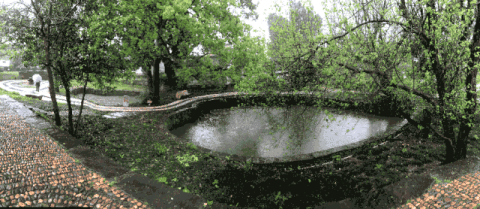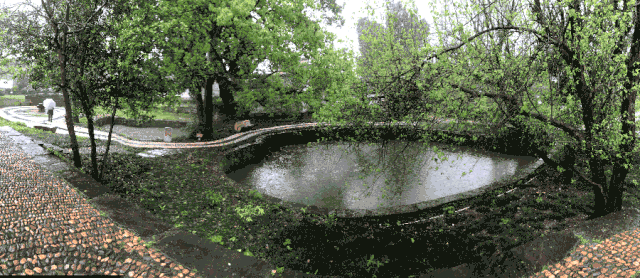
What did you see?
Pebbles + path?
Pond + ancient trees?
Peaches + pears?
Tai Chi + Yin Yang?
The people of the past have passed away,
The bricks and stones are silent,
The grass and trees are speechless,
Only from the existing landscape,
Speculating on the cause,
Analyze builder motivations.
Who built this paradise-like place? It turned out to be a great writer and politician in the Northern Song Dynasty. Ouyang Xiu Descendants. The feng shui of a place nurtures its people! Such an elegant environment will definitely produce a great writer!
At this moment, I thought of the article "The Drunkard's Pavilion" that I read in primary school. Unfortunately, I can't memorize it now. I only remember the famous line from time to time: "The heart of a drunkard is not in the wine, but in the mountains and rivers."... Deeply I deeply feel that young people don’t know how to study hard, and only when they are old will they regret that they were late in studying!
The Ouyang clan values literature and education, cultivates and studies family traditions, and has a strong academic style. He was honored to respect Ouyang Xiu, and inherited the literary style and family motto of his ancestors. Generations of virtuous people have emerged, and a large number of Ouyang's descendants have appeared in the annals of history. The Ming Dynasty's saying "when a father and his son pass the imperial examination, only the younger brother Lianke" originated from here.
He hopes that the descendants and grandsons of the Ouyang clan can continue the literary tradition and be filled with peaches and plums all over the world!
There is an ancient : Bai Juyi of the Tang Dynasty, "Fenghe Linggong Plants Flowers in the Green Wild Hall": "Linggong has peaches and plums all over the world, why should he plant more flowers in front of the hall?"
Today there is : Ouyang built the "Peach and Plum Pond" to express his wishes!

Upon closer inspection, it turns out that of the two ponds, one is in the shape of a peach and the other is in the shape of a plum, with peach trees and plum trees planted next to them respectively. One big and one small, one yin and one yang. The center point of Tai Chi is an old camphor tree. There are towering ancient trees and stone paths. I meditate in the rain and look for the traces left by the ancients at that time...
Doesn't this symbolism mean "the world is full of peaches and plums"? This beautiful auspicious culture has been everywhere since ancient times.
In Feng Shui, "the elephant is greater than the five elements", so when the ancients chose and built their living environment, they always combined cities, villages, residences, etc. with the symbolism, so there were exquisite stone carvings, wood carvings and paintings. The auspicious culture, imperial examination culture, clan culture, religious culture, and ecological and environmental protection culture contained in it are still worthy of our study.
Unlike today's rich people pursue a life of luxury and debauchery after getting rich, and show off their wealth through luxury cars and wearing gold and silver to prove to the world that they are capable and wealthy. However, nouveau riche without cultural accumulation can only last for three or five generations, and most of them will decline in the future.
When I left Diaoyuan Ancient Village, I thought that the ancients still had a sense of planning and layout of "the unity of nature and man", and that modern people's cultural vision should be broader and advanced. How to create modern urban living Feng Shui is also the direction I have been studying.
Family Instructions It should continue in each of our families. The ancients had courtyards, so they could carve on plaques, stone carvings, and architectural details. Modern study rooms and children's rooms are bigger and more spacious than before, but where have our literary style and family mottos gone?
Therefore, I still recommend hanging "Zhu Xi's Family Instructions", "Portrait of Confucius" and "Wenchang Tower Bureau" in the children's study. Only the Wenxun family can survive for a long time.
